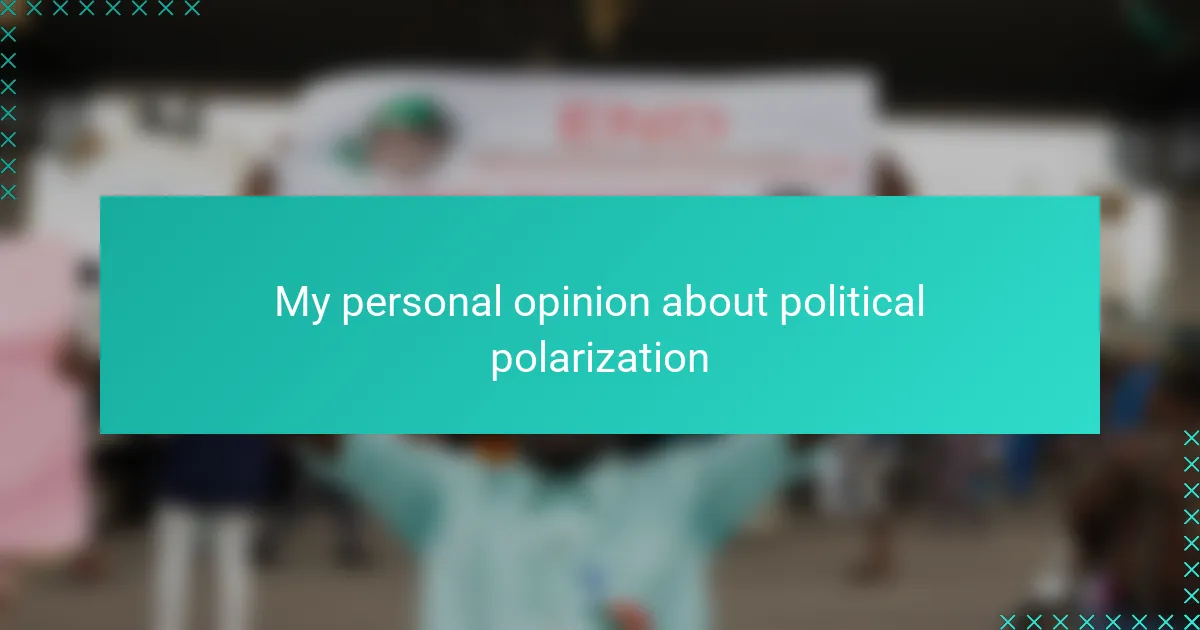Key takeaways
- Political polarization affects personal relationships and everyday interactions, creating divisions that go beyond politics.
- Social media and economic inequality contribute significantly to the deepening of political divides globally.
- Genuine dialogue and education are essential strategies for reducing polarization and rebuilding trust in communities.
- Empathy and active listening can transform discussions from confrontations into opportunities for understanding and connection.
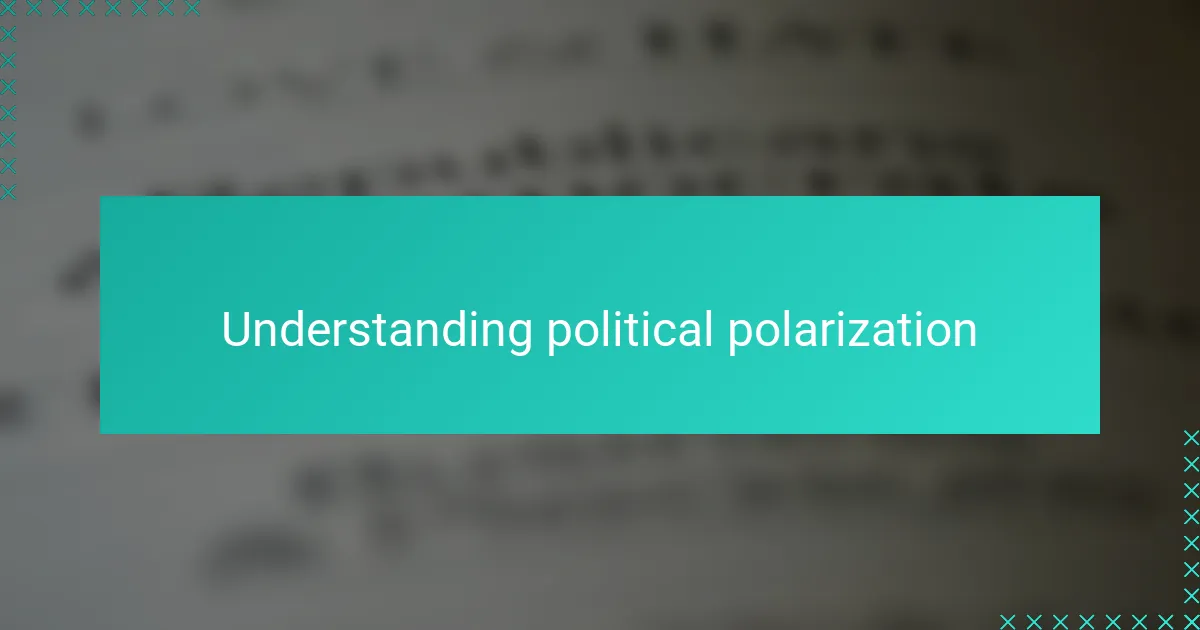
Understanding political polarization
Political polarization, to me, feels like a widening rift where shared ground is shrinking day by day. I’ve often wondered why people close themselves off to alternate views as if disagreement threatens their very identity. Is it fear of being wrong, or simply the comfort of certainty?
From my experience, polarization isn’t just about politics; it’s deeply personal. I recall family dinners where conversations would quickly turn tense, as if differing opinions carried an unspoken risk. That emotional charge makes me question how often we prioritize winning over understanding.
What strikes me most is how this division transforms everyday interactions. When was the last time you felt free to express a nuanced opinion without being instantly labeled or dismissed? It’s a reminder that political polarization extends far beyond policy—it shapes how we connect as human beings.
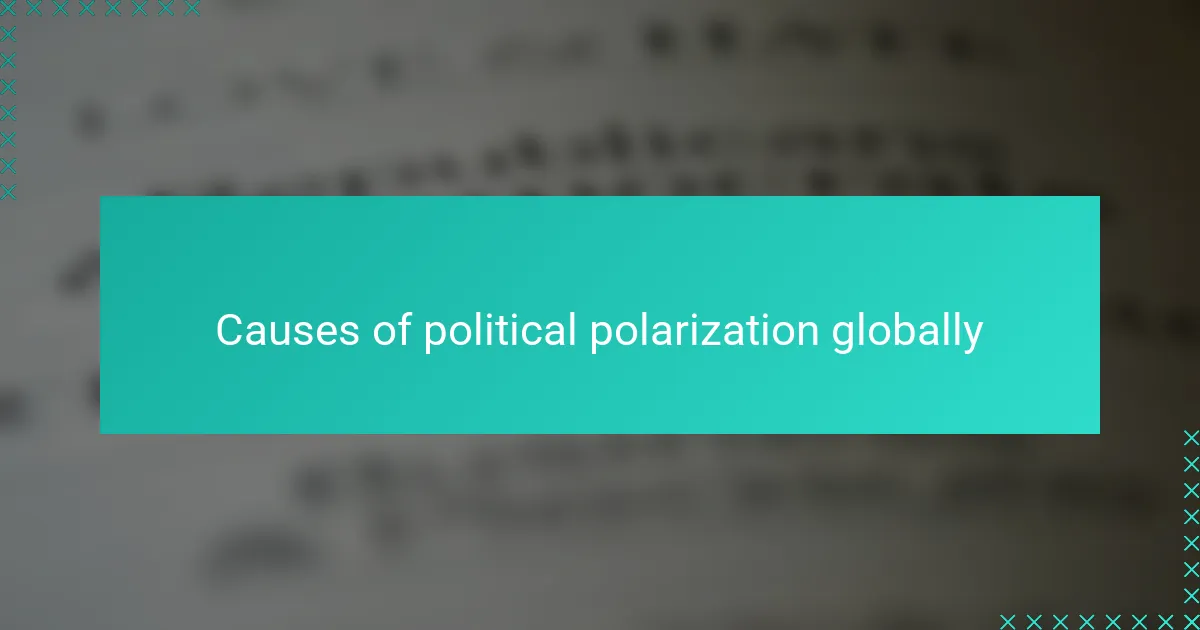
Causes of political polarization globally
One cause I’ve noticed firsthand is the role of social media. It creates these echo chambers where we mostly hear what aligns with our existing beliefs. Have you ever caught yourself scrolling through your feed and realizing you’re surrounded by the same viewpoint over and over? That selective exposure limits our chance to understand opposing perspectives.
Economic inequality also plays a significant role in deepening divides globally. When people feel left behind or ignored by the system, their frustration often manifests as rigid political stances. I remember conversations where anger about job loss or stagnant wages quickly morphed into broader political resentment—it’s hard not to see how these feelings entrench polarization.
Finally, cultural and identity factors can’t be overlooked. People tend to rally around groups with shared histories, values, or fears, which unfortunately sometimes means excluding others. It makes me wonder—how much of political polarization is about protecting a sense of belonging rather than the actual policies themselves? That emotional need for security is powerful and often underpins the divisions we see.
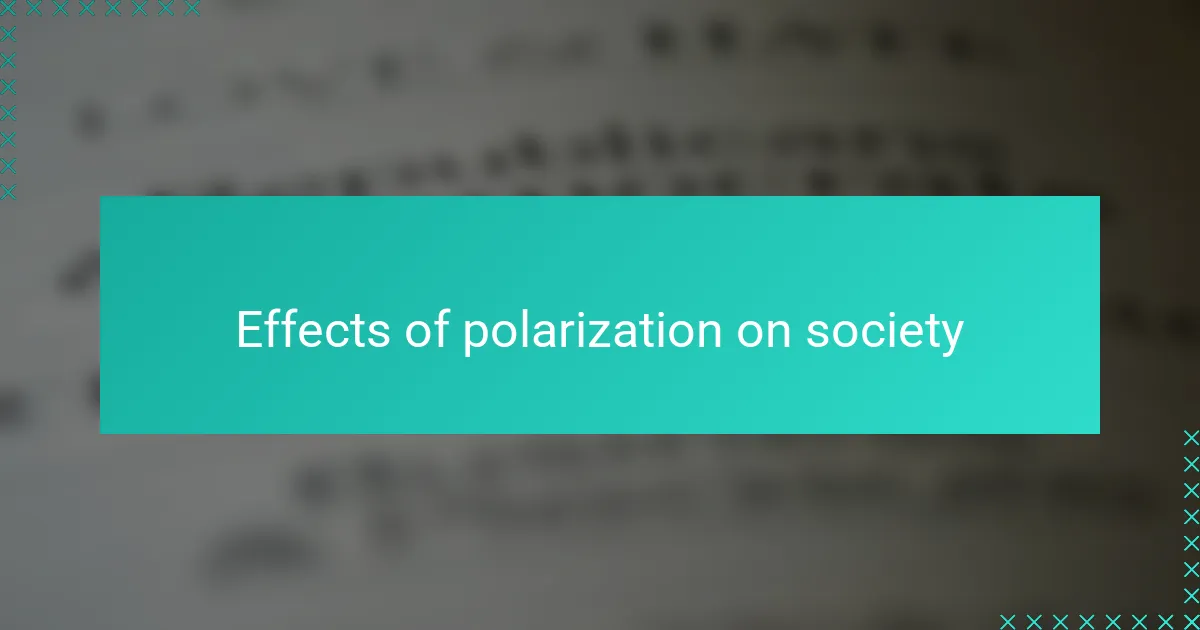
Effects of polarization on society
The effects of polarization on society feel deeply unsettling to me because they erode trust and empathy between people. I’ve noticed how neighbors who once shared friendly chats now avoid political topics, almost as if those conversations could spark conflict. Isn’t it alarming that differing opinions can turn familiar faces into strangers?
What stands out even more is how polarization seeps into our institutions. I’ve watched public debates degrade into shouting matches where compromise seems impossible. It makes me question: how can societies function healthily when cooperation gives way to division?
On a personal level, this divide fosters isolation and anxiety. I recall feeling hesitant to speak openly among friends, worried that my views would be misunderstood or provoke anger. That constant guard feels exhausting, and I wonder how many others silently bear this burden in their daily lives.
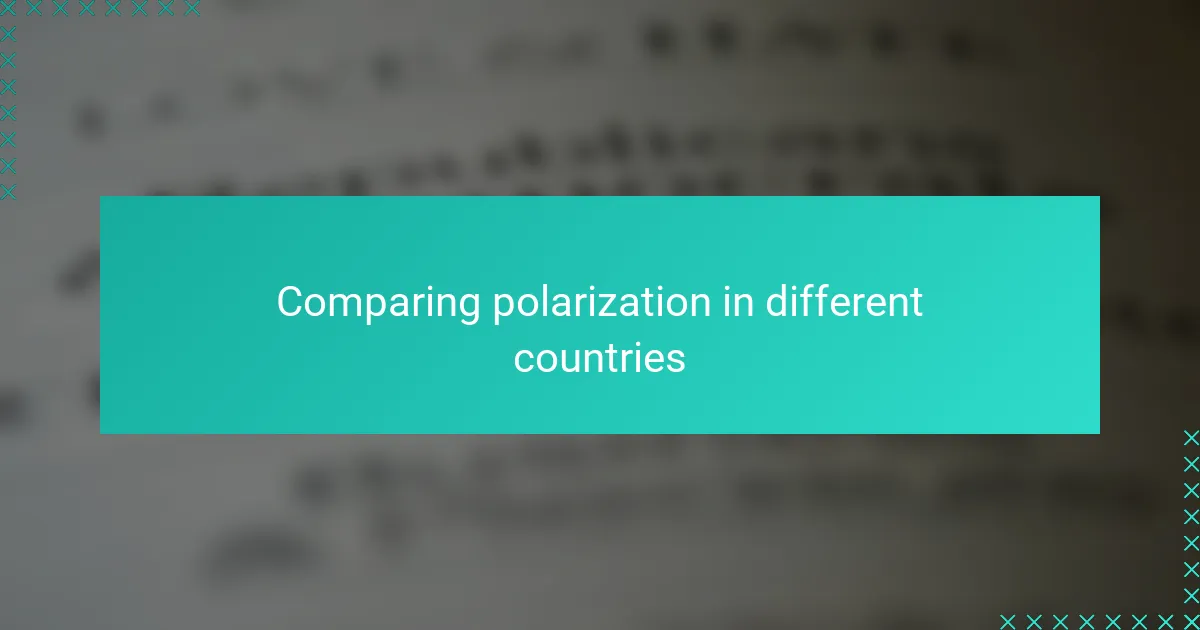
Comparing polarization in different countries
I’ve noticed that political polarization doesn’t look the same everywhere—it shifts with each country’s history, culture, and social fabric. For example, in the United States, polarization often boils down to sharp ideological battles that feel almost tribal, while in places like Germany, it seems more about addressing historical wounds and balancing diverse voices. Have you ever compared how neighbors across the globe experience these divides differently?
From my observations, some countries manage polarization with stronger social safety nets and more robust public discourse, which seems to soften the edges of division. I remember reading about Scandinavian nations where political differences exist but rarely descend into hostility, partly because there’s a common trust in institutions. Doesn’t that make you wonder if trust is a crucial ingredient missing elsewhere?
Yet, in other regions, polarization carries a more dangerous weight—sometimes linked to ethnic or religious identities—that makes reconciliation feel harder. I reflect on how, in certain countries, political debates aren’t just disagreements but battles over who belongs. When politics becomes entwined with identity this tightly, I worry about the long-term fabric of society.
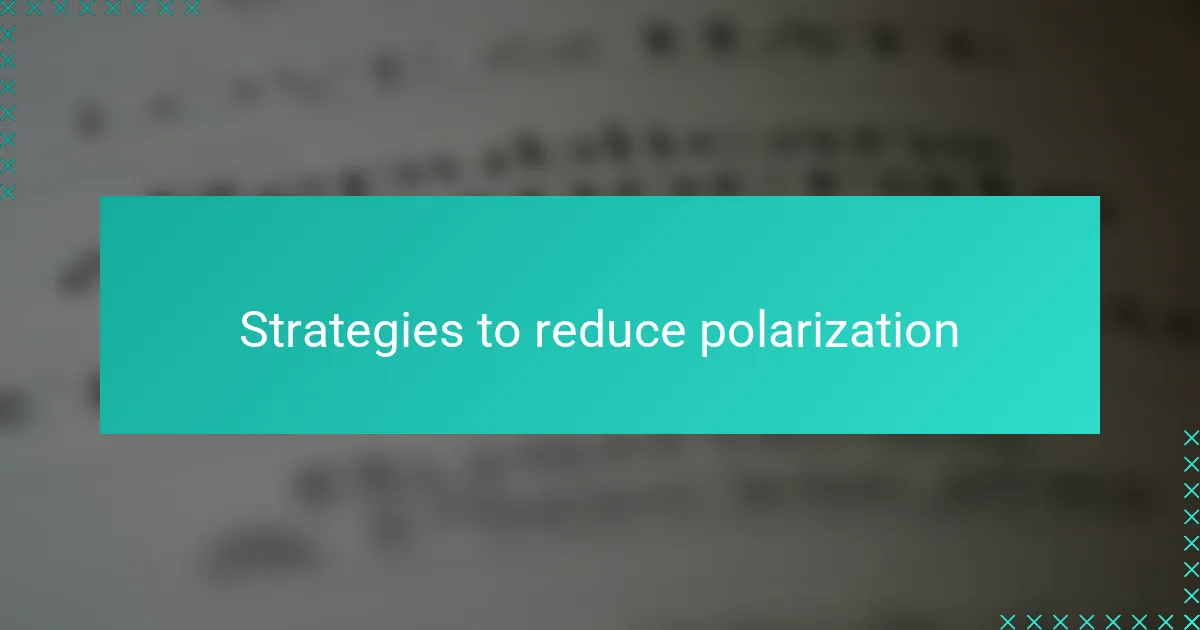
Strategies to reduce polarization
One strategy I find promising is fostering genuine dialogue across divides. I remember attending a community forum where people from vastly different backgrounds shared their experiences without interruption. That simple act of listening, without the rush to respond or rebut, showed me how much common ground we can discover when we choose empathy over argument.
Education also plays a crucial role in reducing polarization. When I think about classrooms encouraging critical thinking and media literacy, I see a path forward. Could teaching people how to evaluate information critically and question their biases help soften entrenched positions?
Finally, I believe institutional reforms that promote transparency and fairness can rebuild trust. From my experience, when citizens feel the system works for everyone, there’s less need to retreat into tribal identities. Isn’t it worth exploring how policies that increase participation and accountability might bridge some of these divides?
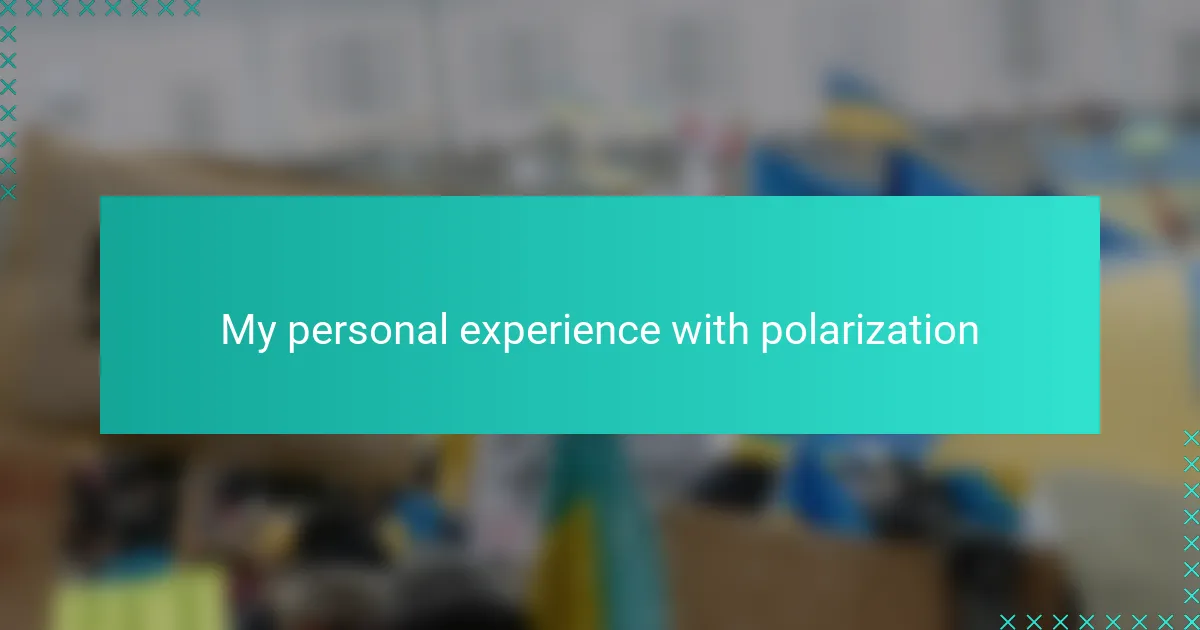
My personal experience with polarization
I’ve lived through moments where polarization hit closest to home, like during a neighborhood meeting meant to discuss community issues but quickly spiraled into political sparring. It left me feeling disconnected from people I once saw as neighbors, which surprised me because I never expected politics to reshape those everyday relationships so deeply.
One vivid experience stands out: a close friend and I found ourselves on opposite sides of a heated debate. The conversation ended abruptly, leaving a strange silence that lasted for days. It made me realize how polarization not only divides nations but also fractures friendships, sometimes without any resolution in sight.
Have you ever noticed how, in polarized settings, you start second-guessing your own views just to avoid conflict? I’ve caught myself dialing back opinions or even avoiding discussions altogether, which feels like a slow erosion of authentic interaction. It’s a lonely place when you feel you must hide parts of your identity to maintain peace.
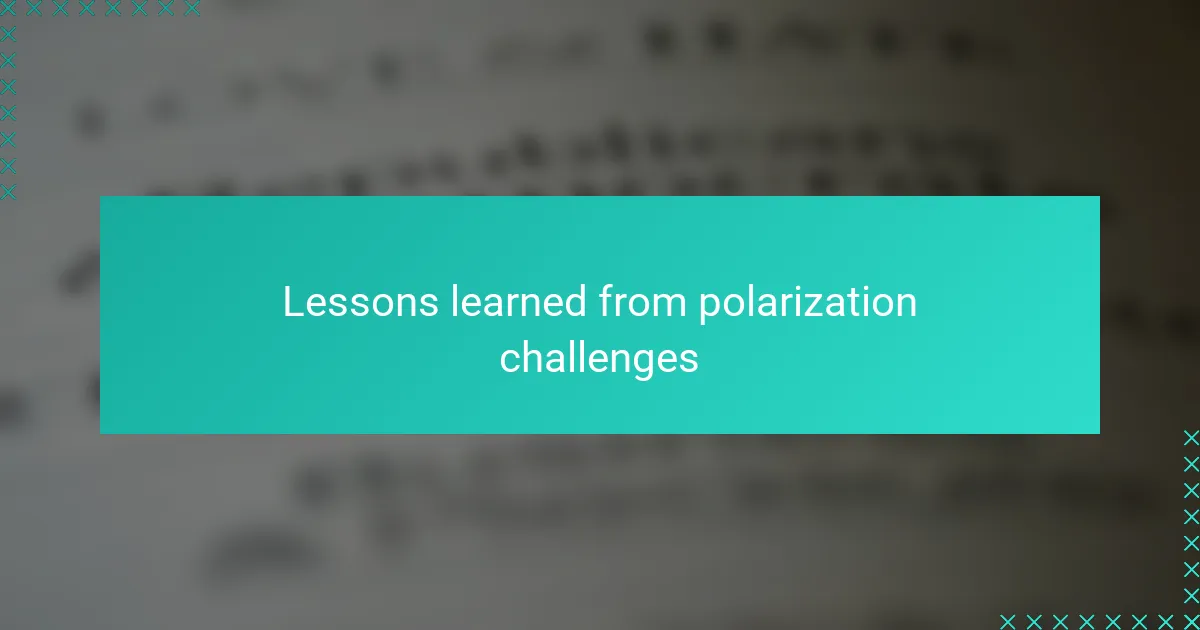
Lessons learned from polarization challenges
From what I’ve observed, one key lesson is that polarization challenges often teach us the hard truth about the fragility of dialogue. When conversations become battlegrounds instead of bridges, we lose more than just information—we lose trust. Have you ever wondered why it’s so difficult to simply agree to disagree without the conversation turning sour? This realization has made me value patience and active listening more than ever.
Another insight I’ve gained is that polarization exposes the dangers of isolation—both social and intellectual. In my experience, when communities retreat into their own echo chambers, perspectives narrow and hostility grows. I recall a time when a diverse group I was part of struggled to find common ground; it was only after we stepped outside our usual circles and shared personal stories that real understanding began to blossom. Doesn’t that suggest that human connection might be the best antidote to division?
Lastly, polarization challenges have underscored the importance of empathy as a practical tool, not just a nice idea. I’ve learned that empathy isn’t about surrendering your views but about recognizing the humanity behind them. When I forced myself to ask—what fears or hopes drive this person’s stance?—conversations became less about winning and more about learning. Could embracing this mindset lead us closer to healing these divides?
